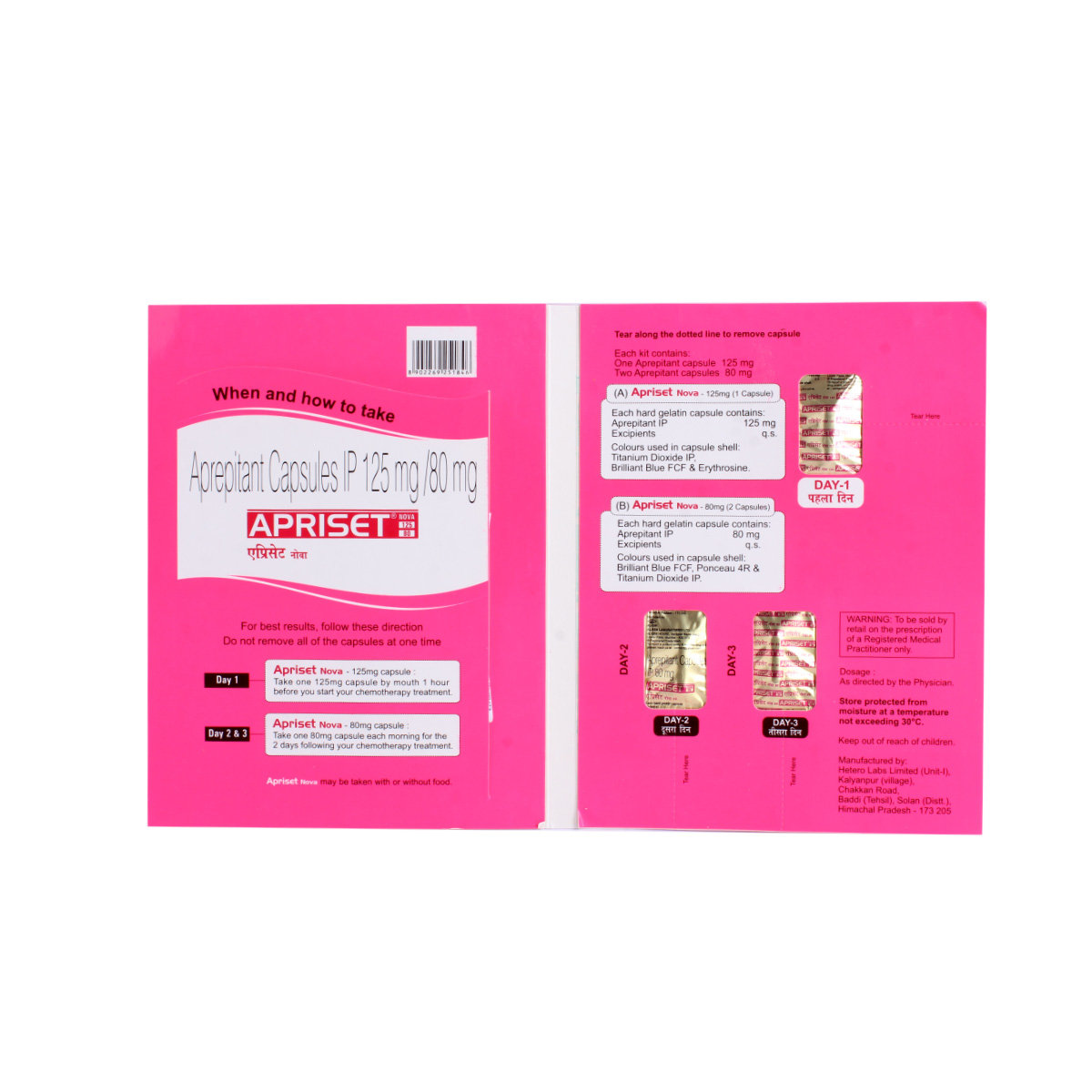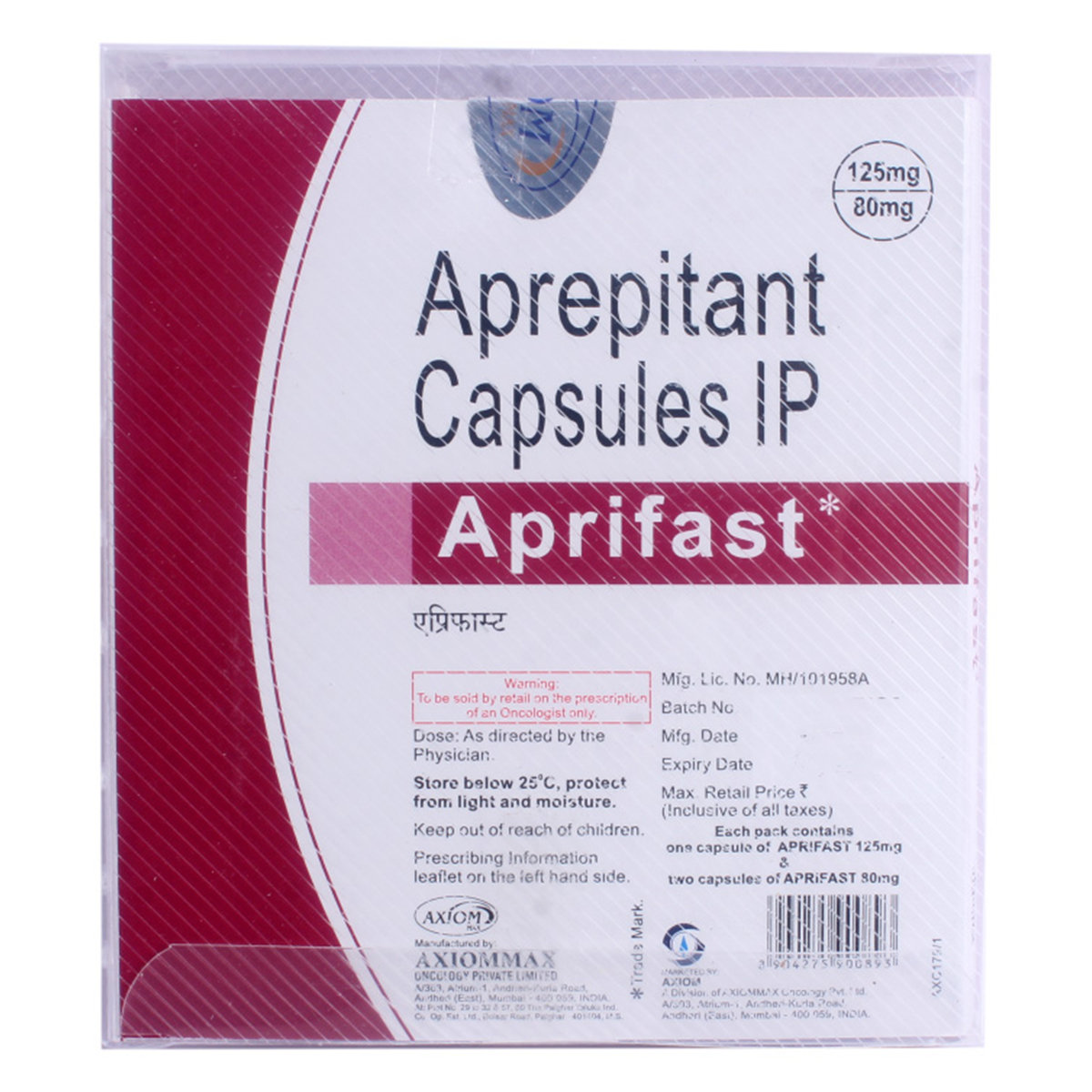Aprepitant
About Aprepitant
Aprepitant belongs to a class of drugs called anti-emetics. It is used in combination with other medicines to prevent nausea and vomiting caused by chemotherapy (anti-cancer medicines) in adults and adolescents aged 12 years and above. Nausea is a feeling of uneasiness in the stomach that often comes before vomiting. On the other hand, vomiting is the forcible voluntary or involuntary emptying of stomach contents through the mouth.
Aprepitant contains Aprepitant, a neurokinin 1 (NK1) receptor antagonist which works by blocking the neurokinin-1 receptor (causes the feeling of sickness) present in the vomiting centre in the brain. Thus, it helps prevent nausea and vomiting.
Take Aprepitant as prescribed. You are recommended to take Aprepitant for as long as your doctor has advised it. In some cases, Aprepitant may cause common side effects such as headache, constipation, loss of appetite, tiredness, indigestion, and hiccups. Most of these side effects do not require medical attention and gradually resolve over time. However, consult your doctor immediately if the side effects persist or worsen.
Please tell your doctor if you are allergic to Aprepitant or any other medicines. Aprepitant is not recommended for children below 12 years of age. If you are pregnant or breastfeeding, please inform your doctor before taking Aprepitant. Avoid driving or operating machinery if you feel dizzy or sleepy after taking Aprepitant. If you are taking other prescription or non-prescription medicines, inform your doctor before taking Aprepitant.
Uses of Aprepitant
Medicinal Benefits
Aprepitant contains Aprepitant, an anti-emetic (a drug used to treat nausea and vomiting) that works by blocking the action of a natural substance in the brain called neurokinin that causes nausea and vomiting. Thus, it is used in combination with other medicines to prevent nausea and vomiting caused by anti-cancer medicines in adults and adolescents from the age of 12 years.
Directions for Use
- Aprepitant can be taken with or without food because food does not impact its effectiveness.
- It is usually taken once a day; however, follow your doctor’s advice regarding the dosage and duration.
- Swallow Aprepitant as a whole with a glass of water.
- Do not break, chew, or crush it.
Storage
Side Effects of Aprepitant
- Headache
- Constipation
- Loss of appetite
- Tiredness
- Indigestion
- Hiccups
Drug Warnings
Please tell your doctor if you are allergic to Aprepitant or any other medicines. Aprepitant is not recommended for children below 12 years of age. If you are pregnant or breastfeeding, please inform your doctor before taking Aprepitant. Avoid driving or operating machinery if you feel dizzy or sleepy after taking Aprepitant. If you are taking any other prescription or non-prescription medicines, inform your doctor before taking Aprepitant.
Drug Interactions
Drug-Drug Interactions: Avoid taking Aprepitant with antipsychotics (pimozide), antiallergic drugs (terfenadine, astemizole), and gastroprokinetic agents (cisapride). Aprepitant may interact with immunosuppressants (tacrolimus, everolimus, cyclosporine, sirolimus), pain killers (fentanyl, alfentanil), the medicine used to treat an irregular heartbeat (quinidine), anticancer medicines (etoposide, vinorelbine, irinotecan, ifosfamide), blood thinners (acenocoumarol, warfarin), antibiotics (clarithromycin, telithromycin, rifampicin), anticonvulsants (phenytoin, carbamazepine), medicines used to produce calmness or help you sleep (triazolam, phenobarbital, midazolam), antifungals (ketoconazole, voriconazole, posaconazole, itraconazole), antidepressant (nefazodone), corticosteroids (dexamethasone, methylprednisolone), anti-anxiety medicines (alprazolam), antidiabetic agent (tolbutamide) and medicines used to treat migraines and HIV infections.
Drug-Food Interactions: Aprepitant may interact with St. John’s Wort (herbal preparation used to treat depression).
Drug-Disease Interactions: If you have liver disease, inform your doctor before taking Aprepitant.
Drug-Drug Interactions Checker List:
Safety Advice

Alcohol
consult your doctorThe interaction of alcohol with Aprepitant is unknown. If you have any concerns regarding this, please discuss them with your doctor.

Pregnancy
consult your doctorIf you are pregnant or planning pregnancy, inform your doctor before taking Aprepitant. Your doctor may prescribe this medicine only if clearly needed.

Breast Feeding
consult your doctorIt is unknown whether Aprepitant is excreted in breast milk. Hence, if you are a nursing mother, inform your doctor before taking Aprepitant.

Driving
cautionAprepitant may cause dizziness or drowsiness in some people. Hence, do not drive or operate machinery if you feel dizzy or drowsy after taking Aprepitant.

Liver
cautionIf you have liver disease, inform your doctor before taking Aprepitant. Your doctor may monitor your liver condition.

Kidney
consult your doctorIf you have any kidney problems, inform your doctor before taking Aprepitant.

Children
unsafeAprepitant is not recommended for children below 12 years of age.
Habit Forming
Diet & Lifestyle Advise
- Eat a healthy and low-fat diet that includes lots of fruits and vegetables, lean meats, skinless poultry, nuts, fish, whole grains, and plant-based oils, especially in small portions, as it will be easy for digestion.
- Avoid eating over-sweet food and include more salty food, especially if you have been vomiting.
- Increase the intake of fluids. Drink a small amount of water after small intervals to stay hydrated.
- Avoid taking greasy or oily foods, as these foods trigger nausea and vomiting.
- If the smell of food makes you feel sick (vomit), do not cook food, as it may worsen your condition. Let someone else do the cooking or use prepared food from the freezer.
Patients Concern
Disease/Condition Glossary
Nausea and vomiting: Nausea is an uneasiness in the stomach that usually precedes vomiting. Vomiting, on the other hand, is a normal bodily response in which a person desires to evacuate stomach contents from the mouth aggressively. In brief, nausea and vomiting are symptoms of a variety of disorders, including infections, motion sickness, an early stage of pregnancy, and gastroparesis (slow stomach emptying). Vomiting is controlled by a receptor in the brain known as the chemoreceptor trigger zone (CTZ). After chemotherapy and radiation therapy, nausea and vomiting are common side effects. It can also arise as a side effect of an operation or surgery. Controlling vomiting and nausea in cancer patients is critical for conducting daily tasks. It can cause mental abnormalities, lack of appetite, malnutrition, and dehydration if not managed.
FAQs
Aprepitant is used to treat Chemotherapy-induced nausea and vomiting.
Aprepitant works by blocking the action of a natural substance in the brain called neurokinin that causes nausea and vomiting. Thus, it is used in combination with other medicines to prevent nausea and vomiting caused by anti-cancer medicines in adults and adolescents from the age of 12 years.
You are not recommended to take erythromycin with Aprepitant as it may increase the blood levels and effects of Aprepitant. Contact your doctor if your condition changes or experience side effects such as diarrhoea, constipation, nausea, or loss of appetite. However, please consult your doctor before taking other medicines with Aprepitant.
You are advised not to take hormonal birth control medicines such as birth control pills, implants, skin patches, and certain Intrauterine devices (IUDs) as they may not work properly when taken together with Aprepitant. Therefore, you are recommended to use another or additional non-hormonal form of birth control method during treatment with Aprepitant and for up to 2 months after using Aprepitant.






